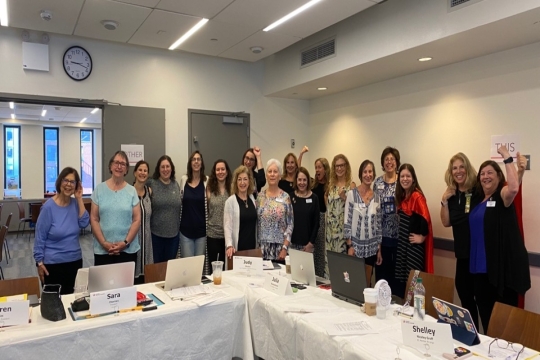
I suspect that everyone has gone through an experience in which you felt resentful, angry or depressed about a past encounter with someone and found it hard to get past it. Someone close to you may have said, “Get over it! Put it in your past! Dwelling on it won’t make any difference.” Personally, those responses have never really helped me move on. In fact, it was more helpful when a friend or family member helped me talk it through, either to simply allow me to blow off steam, or, in more layered situations, to help me better understand what dynamics might have led to the hatred shared with me- dynamics that might not be apparent to me, and might actually be a good life lesson from which I could learn.
In our Torah portion, Ki Tetzei, there are no fewer than 74 commands. Two of Moses’ commands seem particularly unusual and are related to the feeling of “hatred” which the Israelites had experienced from two different groups of people - the Amalekites and the Egyptians. One hatred is irrational and one is logical.
About the Amalekites, Moses commands the Israelites “Remember what the Amalekites did to you along the way when you came out of Egypt. When you were weary and worn out, they…attacked all who were lagging behind; they had no fear of God…. You shall blot out the name of Amalek from under heaven.”
The Amalekites attacked the Israelites as they were on their journey out of Egypt. They abused the Israelites when they were weary and downtrodden. Basically, the Amalekites “hit them when they were down” – and for no obvious reason. The Amalekites’ hatred of the Israelites was irrational and unconditional. That left the Israelites with no way to address that hatred. There was nothing the Israelites could do with it, no way to find meaning in it and learn from it. Nothing concrete to which they could respond. No matter how hard they might have tried there was no meaningful lesson the Israelites might have learned from the experience, other than the fact that – yes – sometimes people do things that are mean and hurtful and there is no way to respond other than to just “move on” from it.
How does one respond to that type of hatred since it makes no sense? Much like we might console a young child when they complain that a “friend” was just mean to them. While in many situations there may be a teaching moment within the scenario, often there simply is not, and we have to tell our children (or each other!) that it is really disappointing when someone is simply mean or unfair for no clear reason.
On the other hand, Moses declares, “Do not hate an Egyptian, because you were a stranger in his land.” At first glance one might say, “Why should an Israelite ‘not hate’ an Egyptian? They enslaved us for forty years. They beat us. We have every right to hate them.” The Egyptians’ hatred of the Israelites was rational and logical. Yes – it was extremely painful, but if you take a step back to observe the cause of it you can see from where the hatred stemmed. Pharaoh told his people that the Israelites were becoming too numerous and strong. Simply, he was afraid that they would take over his land and kingdom and that the Egyptians would be driven from their land. This was a very realistic threat which caused the Egyptians to hate the Israelites. It was “logical and rational.” Since this was such a great concern to the Pharaoh and his people, they turned on the Israelites. They treated them as slaves, made their lives unbearable, and forced them to flee to their freedom. Moses tries to embolden them not to just “move on,” but to take what they faced in Egypt and learn from it. There were tangible lessons from which to learn: how to respond to a confrontation in which you feel threatened, what to do when all the causes are not clear, how to bond together as a community to fight off the injustice being done to you. When dealing with a “rational hatred” there may be an opportunity to respond and reason with the person who is exhibiting the hatred in the moment. The Israelites might have impressed upon the Egyptians that their fear of being overtaken by them was unnecessary, that they might have been able to “make things work.” More often, though, that moment does not exist and you are left with the hurt and confusion. Since that did not happen, Moses, having led his people to freedom from Egyptian tyranny and hatred, tried to impress upon the Israelites that, in remembering that they were once slaves in Egypt they can right the wrong of the Egyptians should they (the Israelites) find themselves in a similar situation with other peoples in their future, people who would be “strangers in the land” owned by the Israelites or those who experience similar hardships as the Israelites had. His message was to remember the feeling they had as strangers in Egypt, and while they shouldn’t blot out the memory, they should turn it into an opportunity to be better to people in the future who may be strangers in their land in the same position.
And when that young child says that their friend was so mean, it may be a “just move on” moment. We might want to stomp our feet and bang our fists and moan in anger, which does release some good energy and may make you feel better in the moment. However, it might also be a “maybe your friend didn’t understand what you were trying to tell her, or maybe your friend was jealous of you, or maybe that friend was feeling very insecure but couldn’t express it and lashed out in anger instead” moment. All dynamics which happen often but are often difficult to unmask, especially for children.
As adults – as Jewish women in positions of leadership – at the core of everything we do are people. Individuals whose lives are undoubtedly complicated and filled with dynamics – the positive and the negative – which may not be apparent to anyone around them. That often leads to language and behavior, often hurtful - which can easily be misunderstood. Or, we wind up lashing out (even if it is only in our own minds) at that person because they hurt you.
It is incumbent upon us to learn more about “listening” and “noticing.” Try to hear what the person is really saying, or what might be behind their words. Pay attention– notice– how they are behaving and, possibly, why. The truth of a person’s existence is not always so clear and so their unkind behavior may seem completely irrational, like the Amalekites’. However, when we listen beyond the words we are hearing and we notice beyond what we see in front of us we may very well have a better understanding of the hateful words and behaviors which are being used and the why. Even if you are never able to confront that person, you will be left with the sense that the behavior which so offended you came from a real place of hurt or fear or insecurity or jealousy, and should you be in a similar position in the future you will watch your words and your behavior and remember that “you were a stranger in his land,” too.
The next time someone with whom you are working in your women’s group seems to be unnecessarily hurtful to you and behaves in a manner which simply does not make sense to you, think back to Moses’ commands. Do you simply move on and accept that sometimes people can be mean, or do you listen and notice and try to understand the human condition this person may be masking – and seek to understand what you can, beyond simply feeling hurt? It is what will make for stronger relationships, for people learning to embrace one another’s lives in meaningful ways and understand what is not always obvious but is definitely significant.
Dr. Madelyn M. Katz is a retired Reform Jewish educator, having served for forty years as a synagogue educator, day school director and Director of Student Life and Associate Dean at the Hebrew Union College in Los Angeles. Her passion lies in teaching about leadership and specifically personal leadership narratives. She serves as a member-at-large on the North American Board of the WRJ and is also active in Roots of Reform Judaism.
Related Posts

Parashat Yom Rishon shel Rosh HaShanah

Cultivating a Culture of Accountability and Belonging


